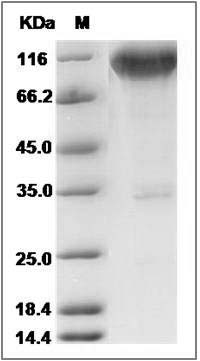-
Product Name
Rat TrkA/NTRK1 (Fc Tag) recombinant protein
- Documents
-
Description
TRKA is a member of the neurotrophic tyrosine kinase receptor (NTKR) family. It is a membrane-bound receptor that, upon neurotrophin binding, phosphorylates itself and members of the MAPK pathway. Isoform TrkA-III promotes angiogenesis and has oncogenic activity when overexpressed. Isoform TrkA-I is found in most non-neuronal tissues. Isoform TrkA-II is primarily expressed in neuronal cells. TrkA-III is specifically expressed by pluripotent neural stem and neural crest progenitors. The presence of NTRK1 leads to cell differentiation and may play a role in specifying sensory neuron subtypes. Mutations in TRKA gene have been associated with congenital insensitivity to pain, anhidrosis, self-mutilating behavior, mental retardation and cancer. It was originally identified as an oncogene as it is commonly mutated in cancers, particularly colon and thyroid carcinomas. TRKA is required for high-affinity binding to nerve growth factor (NGF), neurotrophin-3 and neurotrophin-4/5 but not brain-derived neurotrophic factor (BDNF). Known substrates for the Trk receptors are SHC1, PI 3-kinase, and PLC-gamma-1. NTRK1 has a crucial role in the development and function of the nociceptive reception system as well as establishment of thermal regulation via sweating. It also activates ERK1 by either SHC1- or PLC-gamma-1-dependent signaling pathway. Defects in NTRK1 are a cause of congenital insensitivity to pain with anhidrosis and thyroid papillary carcinoma.
-
Protein short names
DKFZP781I14186; MTC; TKR; TRK1; TRK; TRKA; TRK-A; P140-TRKA; C80751; NTRK1
-
Source/Expression Host
Human Cells
-
Expression Plasmid/cDNA
A DNA sequence encoding the rat NTRK1 (P35739-Isoform TrkA-II)(Met1-Pro418) was expressed with the Fc region of human IgG1 at the C-terminus.
-
Protein Species
Rat
-
Molecular weight
The recombinant rat NTRK1/Fc is a disulfide-linked homodimer. The reduced monomer comprises 627 amino acids and has a predicted molecular mass of 69.2 kDa. The apparent molecular mass of the protein is approximately 92-102 kDa in SDS-PAGE under reducing conditions.
-
Purity
> 95 % as determined by SDS-PAGE
-
Activity
Measured by its ability to inhibit NGF-induced proliferation of TF‑1 human erythroleukemic cells.
The ED50 for this effect is typically 0.01-0.1 µg/mL in the presence of 10 ng/mL of recombinant mouse NGF. -
Validations

Rat TrkA / NTRK1 Protein (Fc Tag) SDS-PAGE
Related Products / Services
Please note: All products are "FOR RESEARCH USE ONLY AND ARE NOT INTENDED FOR DIAGNOSTIC OR THERAPEUTIC USE"
